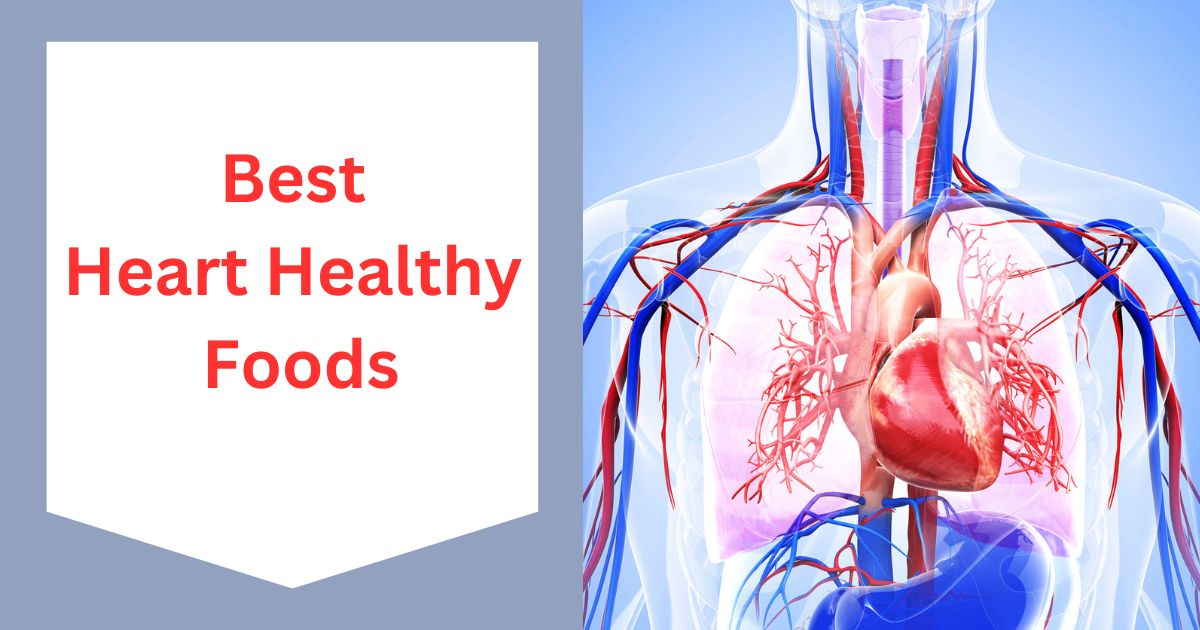Maintaining a healthy heart is essential for overall well-being. The heart, an incredible organ that tirelessly pumps blood throughout our bodies, deserves special attention and care. One of the most effective ways to promote heart health is through a balanced diet. The foods we consume play a crucial role in either supporting or straining our cardiovascular system. In this article, we’ll explore a variety of heart healthy foods that have been scientifically proven to be beneficial for heart health.
Top Heart Healthy Foods
Some foods can benefit your heart and can reduce heart-related health issues. The important heart risk factors are blood pressure, cholesterol levels, triglycerides, and inflammation. The following foods help you to reduce these risks and more.
Fatty Fish
Fatty fish, such as salmon, mackerel, trout, and sardines, are rich in omega-3 fatty acids. These essential fats have been shown to reduce inflammation, lower blood pressure, and decrease the risk of developing heart disease. Omega-3s also help regulate heart rhythm and improve overall heart function. Aim for at least two servings of fatty fish per week to reap these heart-protective benefits.
Leafy Greens
Dark leafy greens like spinach, kale, and Swiss chard are packed with vitamins, minerals, and antioxidants that support heart health. They are low in calories and high in fiber, helping to manage cholesterol levels and maintain a healthy weight. Potassium-rich greens also help regulate blood pressure, reducing strain on the heart.
Whole Grains
Whole grains, including oats, quinoa, brown rice, and whole wheat, are excellent sources of fiber, which aids in reducing cholesterol levels and promoting healthy digestion. These grains have a lower glycemic index, helping to stabilize blood sugar levels and reduce the risk of type 2 diabetes – a condition that can negatively impact heart health.
Berries
Berries, such as blueberries, strawberries, and raspberries, are bursting with antioxidants known as flavonoids. These compounds have been linked to improved heart health by reducing inflammation, enhancing blood vessel function, and protecting against oxidative stress. Incorporate a colorful variety of berries into your diet to benefit from their cardiovascular advantages.
Nuts and Seeds
Almonds, walnuts, chia seeds, and flaxseeds are rich sources of heart-healthy fats, fiber, and plant-based protein. Regular consumption of nuts and seeds has been associated with reduced LDL cholesterol levels and a decreased risk of heart disease. However, portion control is key, as these foods are energy-dense.
Legumes
Beans, lentils, chickpeas, and other legumes are high in fiber, protein, and various vitamins and minerals. They help lower cholesterol levels, manage blood sugar, and promote a healthy weight – all of which contribute to better heart health. Including legumes in your diet can also help reduce the intake of less heart-friendly animal proteins.
Olive Oil
Olive oil, particularly extra virgin olive oil, is a staple of the Mediterranean diet – a dietary pattern associated with a lower risk of heart disease. It is rich in monounsaturated fats, which have been shown to improve cholesterol levels and reduce inflammation. Use olive oil as your primary cooking oil and salad dressing for maximum heart benefits.
Avocado
Avocado is another source of monounsaturated fats, along with potassium, which aids in regulating blood pressure. These creamy delights can help lower bad cholesterol levels while increasing good cholesterol levels. Incorporate avocados into sandwiches, salads, or as a spread in place of less heart-healthy alternatives.
Tomatoes
Tomatoes are a vibrant and versatile fruit that offer a wealth of benefits for heart health. Packed with essential nutrients like potassium, fiber, and vitamin C, tomatoes contribute to a balanced diet that supports cardiovascular well-being. The star component of tomatoes is lycopene, a potent antioxidant responsible for their vibrant red color. Lycopene has been linked to a reduced risk of heart disease by helping to lower LDL (“bad”) cholesterol levels, inhibit oxidative stress, and improve blood vessel function.
Green tea
Green tea, cherished for centuries as a soothing and revitalizing beverage, offers a wealth of benefits for heart health. Abundant in potent antioxidants like catechins, particularly EGCG, green tea combats free radicals and reduces oxidative stress, factors that contribute to heart disease. Notably, it aids in cholesterol management by decreasing LDL (“bad”) cholesterol levels and promoting healthy lipid profiles.
Dark chocolate
Dark chocolate, with its rich cocoa content, offers a delectable way to support heart health. Packed with antioxidants such as flavonoids and polyphenols, dark chocolate helps combat oxidative stress by neutralizing harmful free radicals. These compounds contribute to improved blood flow and enhanced blood vessel function, potentially reducing the risk of blood clots and supporting overall cardiovascular health.
By the way, if you want to know what are the best foods for the brain, read our article on the best foods for brain health.
Final Thoughts
Caring for your heart through nutrition is a proactive and empowering choice. The foods mentioned above have been consistently linked to improved heart health by lowering blood pressure, reducing cholesterol levels, and fighting inflammation. However, remember that a balanced diet is essential – no single food can provide all the nutrients your heart needs. Pair these heart-healthy foods with regular physical activity, stress management, and avoiding tobacco to create a holistic approach to cardiovascular well-being. Your heart works tirelessly for you; repay the favor by nourishing it with the best foods nature has to offer.

